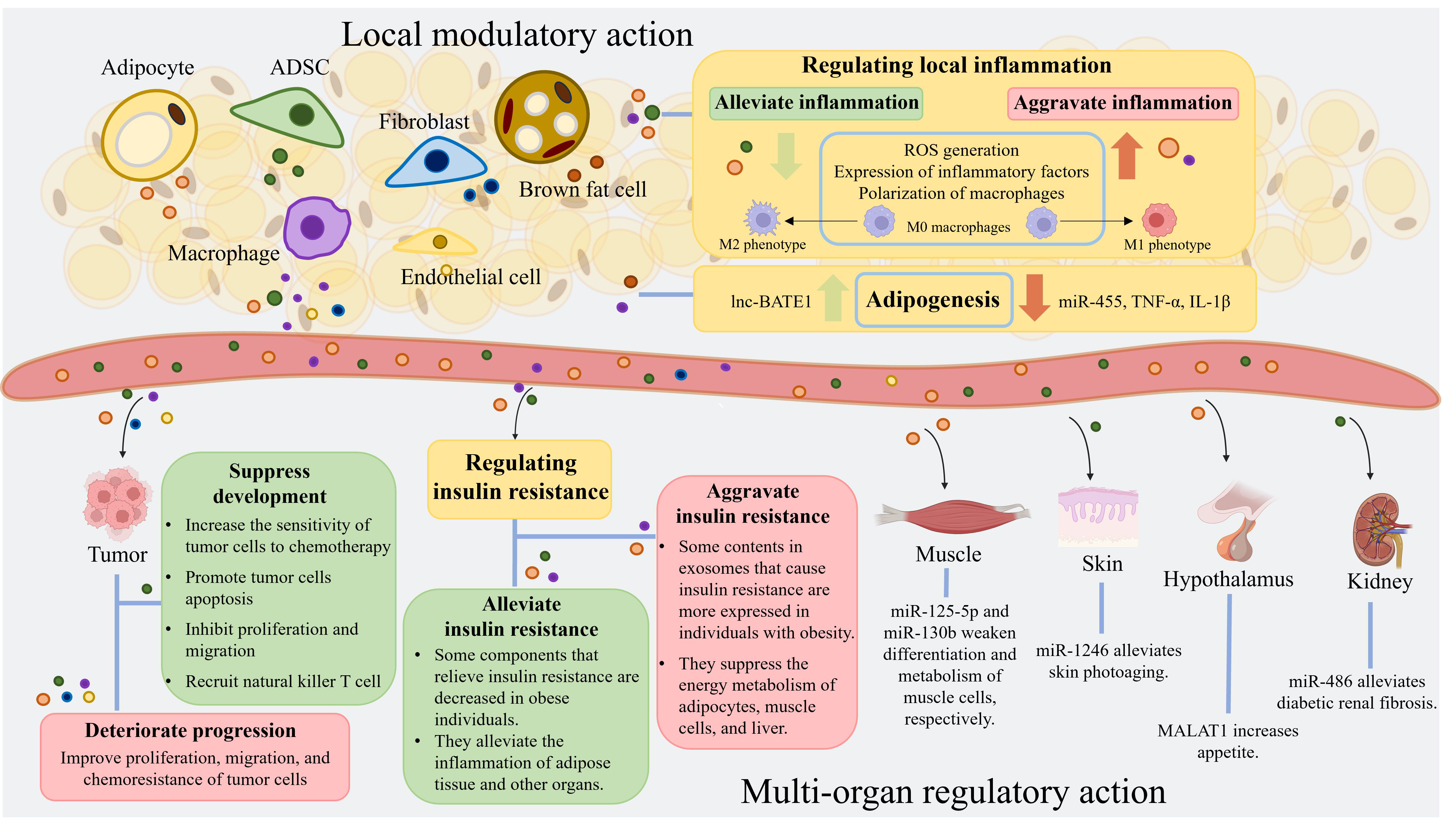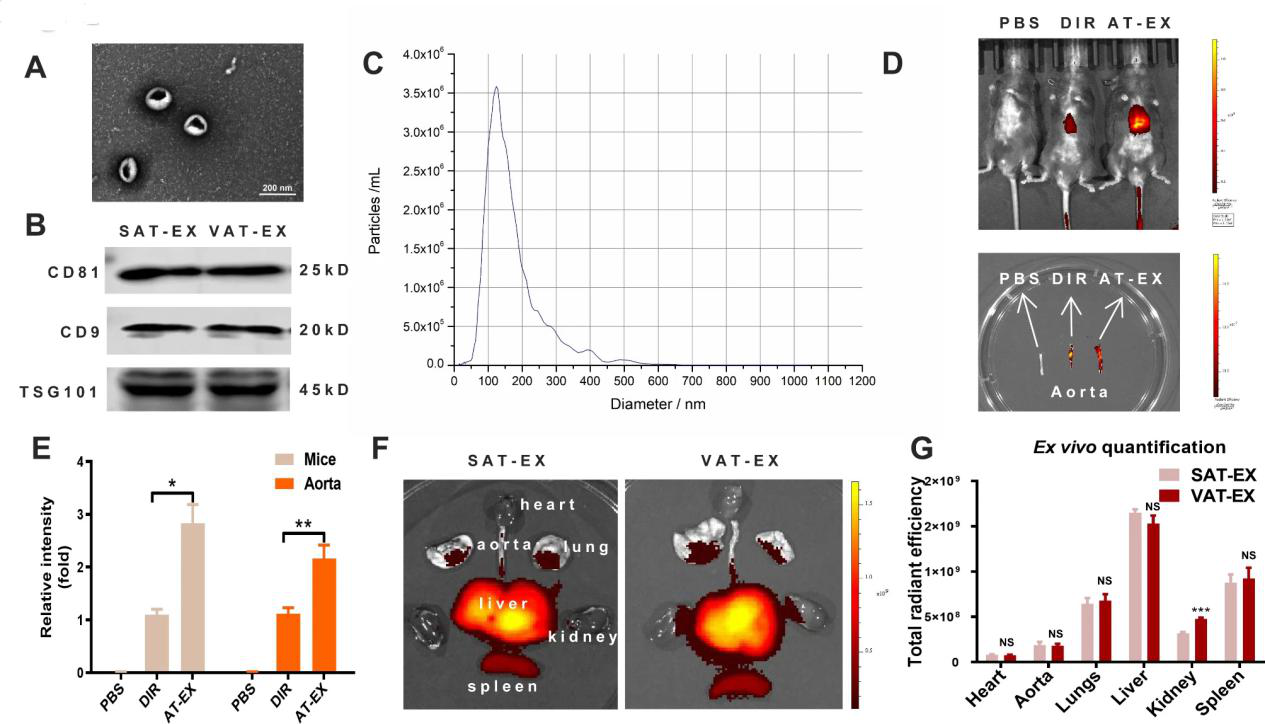Adipose Tissue Exosome Research and Application
Adipose tissue is not only a major energy reservoir but also an endocrine organ with essential regulatory functions. With increasing research attention, adipose tissue has been found to influence local tissue homeostasis and inter-organ communication via the secretion of exosomes. These nanoscale vesicles play important roles in inflammation modulation, metabolic balance, tissue regeneration, and disease development.
Exosomes are actively secreted by adipocytes and widely present in white, brown, and beige adipose tissues. They carry functional molecules such as miRNAs, lncRNAs, proteins, and lipids. These exosomes can locally regulate macrophage polarization, fibroblast activity, and angiogenesis, and can also travel through the bloodstream to influence distant organs—including muscle, skin, kidney, and hypothalamus—participating in key physiological processes such as metabolism, immunity, and appetite control.
Studies have shown that adipose-derived exosomes exhibit disease-specific signaling profiles. For instance, they may promote or suppress tumor microenvironment progression and show distinctive expression patterns in insulin resistance, skin aging, and diabetic nephropathy. Therefore, Adipose Tissue Exosome Research and Application not only helps reveal the mechanisms of metabolic diseases but also serves as a valuable resource for the development of novel diagnostic targets and therapeutic delivery systems.

Wang, Y. et al. Front. Endocrinol. 2024.
Figure 1. Mechanisms of Adipose Tissue Exosomes in Local Immune Regulation and Multi-Organ Functional Modulation
MtoZ Biolabs offers a full suite of services for Adipose Tissue Exosome Research and Application that includes isolation, characterization, multi-omics profiling, and functional engineering. With robust exosome extraction platforms, advanced omics analysis tools, and in vitro/in vivo validation capabilities, we help accelerate both basic research and translational applications worldwide.
Services at MtoZ Biolabs
To meet the comprehensive research needs of Adipose Tissue Exosome Research and Application, MtoZ Biolabs provides an end-to-end service pipeline including:
1. Exosome Isolation and Identification from Adipose Tissue
Customized protocols are available for subcutaneous white fat, visceral fat, brown fat, and beige fat tissues. We employ ultracentrifugation, density gradient separation, and commercial exosome kits to enhance yield and purity.
2. Characterization and Omics Analysis
Exosomes are validated using TEM, NTA, and Western blot, while omics analysis includes proteomics, lipidomics, miRNA profiling, transcriptomics, and metabolomics to identify functional components and signaling pathways.
3. Functional Engineering and Delivery Validation
Services include exosome engineering, miRNA/drug loading, delivery efficiency testing, and in vivo biodistribution studies to assess therapeutic potential.
4. Customized Experimental Design and Consulting
One-stop support from project planning through data interpretation, tailored for research, clinical, and translational applications.
Service Advantages
With Adipose Tissue Exosome Research and Application as our core technical focus, MtoZ Biolabs has built a multi-dimensional service framework for adipose exosome research:
✅ Comprehensive Coverage of Adipose Tissue Types
Capable of processing samples from white (subcutaneous/visceral), brown, and beige fat to support diverse basic and disease-modeling studies.
✅ High-Quality Exosome Preparation
Optimized sample pretreatment ensures purity, structural integrity, and bioactivity, suitable for multi-omics analysis and biological validation.
✅ Deep Multi-Omics Data Mining
Integrated miRNA sequencing, proteomics, lipidomics, and metabolomics help construct adipose exosome functional networks and identify disease-relevant pathways.
✅ Robust Functional Discovery Platform
Supports in vitro and in vivo experiments to explore key roles in inflammation, oxidative stress, immune regulation, and lipid metabolism.
✅ One-Time-Charge
Our pricing is transparent, no hidden fees or additional costs.
Case Study
Case 1: Adipose tissue exosomes reveal pro-atherogenic mechanisms in obesity
In a study based on a high-fat diet-induced obese mouse model, researchers isolated adipose tissue-derived exosomes (AT-EX) to examine their role in atherosclerosis progression. Functional experiments revealed that AT-EX promoted endothelial cell apoptosis and enhanced vascular smooth muscle cell (VSMC) proliferation and migration, accelerating plaque formation. Further analysis identified miR-132/212 as key pathogenic components in AT-EX, acting through GNA12 and PTEN signaling pathways. Treatment with melatonin significantly reduced miR-132/212 levels in exosomes and mitigated their pro-atherogenic effects.

Guo, B. et al. Cardiovasc. Diabetol. 2024.
This study highlights the utility of adipose tissue exosomes in exploring the mechanisms of metabolic diseases. MtoZ Biolabs offers services related to Adipose Tissue Exosome Research and Application that support biomarker discovery and functional studies in metabolic and cardiovascular disease research.
FAQ
Q1: What types of adipose tissue can be used for exosome isolation?
MtoZ Biolabs supports exosome extraction from subcutaneous white fat, visceral fat, brown fat, and beige fat. We apply optimized purification workflows tailored for various tissue types and research applications.
Q2: Are adipose-derived exosomes suitable as early biomarkers for metabolic diseases?
Yes. The miRNA and protein composition of adipose exosomes changes specifically in early stages of obesity, diabetes, and related conditions, making them promising candidates for biomarker development.
Q3: Do lipid-rich samples interfere with exosome isolation?
Our workflows integrate low-temperature centrifugation, optimized density gradients, and enzymatic treatment to reduce lipid contamination and improve exosome recovery and purity.
Adipose tissue exosomes exhibit great potential in metabolic disease research, tumor biology, tissue regeneration, immune regulation, and therapeutic delivery. Their diverse tissue origins and bioactive cargo make them ideal indicators of physiological and pathological states, as well as promising carriers for novel treatment strategies.
As Adipose Tissue Exosome Research and Application continues to gain momentum, MtoZ Biolabs remains committed to advancing this field by offering specialized platforms and customized technical services. If you're working on adipose exosome-related research, we welcome you to connect with us. Let’s explore new frontiers in adipose tissue exosome science—together.
How to order?







